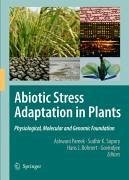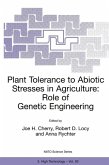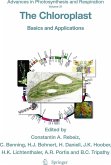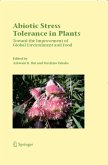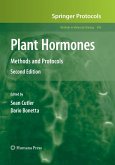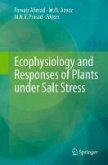Environmental insults such as extremes of temperature, extremes of water status as well as deteriorating soil conditions pose major threats to agriculture and food security. Employing contemporary tools and techniques from all branches of science, attempts are being made worldwide to understand how plants respond to abiotic stresses with the aim to help manipulate plant performance that will be better suited to withstand these stresses. The present book on abiotic stress is an attempt to search for possible answers to several basic questions related to plant responses towards abiotic stresses. This book presents a holistic view of the general principles of stress perception, signal transduction and regulation of gene expression. Further, chapters in this book analyze not only model systems but extrapolate interpretations obtained from models to crops. Lastly, we discuss how stress-tolerant crop or model plants have been or are being raised through plant breeding and genetic engineering approaches. Twenty three chapters, written by international authorities, integrate molecular details with overall plant structure and physiology, in a text-book style, including key references. This book serves as a complete package on the basics and applications for abiotic stress response sensing and genetic and metabolic response pathways in plants; it is designed for use by advanced undergraduate students, graduate students and beginning researchers in the area of stress biology, plant molecular biology, plant physiology, agriculture, biochemistry and environmental biology.
Dieser Download kann aus rechtlichen Gründen nur mit Rechnungsadresse in A, B, BG, CY, CZ, D, DK, EW, E, FIN, F, GR, HR, H, IRL, I, LT, L, LR, M, NL, PL, P, R, S, SLO, SK ausgeliefert werden.
From the reviews:
"The book focuses on the 'physiological, molecular, and genomic' components of the problems and emphasizes various aspects of overcoming stress through breeding, transgenics, and the identification of markers associated with plant responses to stress. ... The quality of the 23 chapters is very high, and they include much very current information from some of the top practitioners in the field. Summing Up: Recommended. Academic libraries serving upper-division undergraduates and above." (W. Loescher, Choice, Vol. 48 (4), December, 2010)
"This book serves as a complete package on the basics and applications for abiotic stress response pathways in plants'. Indeed, at over 520 pages, with 23 predominantly multi-author chapters arranged in four parts, it is a considerable compendium of information and references ... . The book is aimed at 'late undergraduate through to beginning researchers' in many areas of science and technology. ... it is most suited to libraries, where it should find readers and will be useful." (David Lawlor, Annals of Botany, Vol. 107 (4), 2011)
"The book is an important and timely addition in view of the frightening global climate change 'issues and concerns'. ... we would like to congratulate the editors for bringing out this vitally useful volume. ... the book is informative and innovative. Researchers, teachers, graduate students and advanced undergraduate students would benefit from it. We recommended it to all those interested in plants and microbes, and their biology. ... We agree that this is an exciting addition in the field." (Prasanna Mohanty, S. Rajagopal and N. Raghuram, Current Science, Vol. 99 (9), November, 2010)
"The book presents a standard monograph in which individual chapters are written by different authors. The book is divided into four parts and contains altogether 23 chapters. ... the large amount of information contained in this book should be of interest for plant physiologists, stress physiologists, and molecular plant biologists, both researchers and students." (J. Naus, Photosynthetica, Vol. 48 (3), 2010)
"This 500+ page book is a timely and comprehensive survey of plant responses to environmental stress, encompassing together 23 chapters covering a wide range of highly relevant topics dealing with abiotic stress in plants. ... This is a collection of state-of-the-art reviews useful for researchers, academics, and students who are at an advanced stage of study. ... I strongly recommend this book to all the libraries of the universities as well as research institutions that deal with the study of plant biology and plant sciences." (Maitrayee Bhattacharyya-Pakrasi, Photosynthesis Research, Vol. 108, 2011)
"The book focuses on the 'physiological, molecular, and genomic' components of the problems and emphasizes various aspects of overcoming stress through breeding, transgenics, and the identification of markers associated with plant responses to stress. ... The quality of the 23 chapters is very high, and they include much very current information from some of the top practitioners in the field. Summing Up: Recommended. Academic libraries serving upper-division undergraduates and above." (W. Loescher, Choice, Vol. 48 (4), December, 2010)
"This book serves as a complete package on the basics and applications for abiotic stress response pathways in plants'. Indeed, at over 520 pages, with 23 predominantly multi-author chapters arranged in four parts, it is a considerable compendium of information and references ... . The book is aimed at 'late undergraduate through to beginning researchers' in many areas of science and technology. ... it is most suited to libraries, where it should find readers and will be useful." (David Lawlor, Annals of Botany, Vol. 107 (4), 2011)
"The book is an important and timely addition in view of the frightening global climate change 'issues and concerns'. ... we would like to congratulate the editors for bringing out this vitally useful volume. ... the book is informative and innovative. Researchers, teachers, graduate students and advanced undergraduate students would benefit from it. We recommended it to all those interested in plants and microbes, and their biology. ... We agree that this is an exciting addition in the field." (Prasanna Mohanty, S. Rajagopal and N. Raghuram, Current Science, Vol. 99 (9), November, 2010)
"The book presents a standard monograph in which individual chapters are written by different authors. The book is divided into four parts and contains altogether 23 chapters. ... the large amount of information contained in this book should be of interest for plant physiologists, stress physiologists, and molecular plant biologists, both researchers and students." (J. Naus, Photosynthetica, Vol. 48 (3), 2010)
"This 500+ page book is a timely and comprehensive survey of plant responses to environmental stress, encompassing together 23 chapters covering a wide range of highly relevant topics dealing with abiotic stress in plants. ... This is a collection of state-of-the-art reviews useful for researchers, academics, and students who are at an advanced stage of study. ... I strongly recommend this book to all the libraries of the universities as well as research institutions that deal with the study of plant biology and plant sciences." (Maitrayee Bhattacharyya-Pakrasi, Photosynthesis Research, Vol. 108, 2011)

